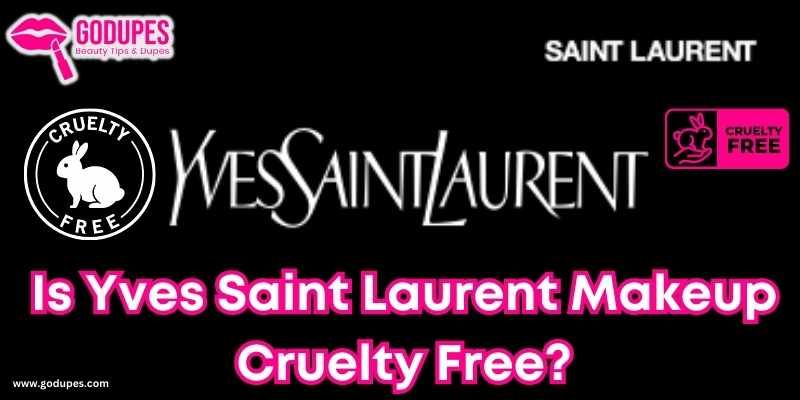No, Yves Saint Laurent makeup is not cruelty-free. While YSL itself may not directly test, its parent company, L’Oreal, sells in mainland China where animal testing is mandated by law. This means some YSL products could be tested on animals.
The Moral Obligation of Cruelty-Free Makeup
Cruelty-free makeup stands as a beacon of ethical consideration within the beauty industry. Advocates of this movement believe that subjecting animals to cosmetic testing is morally objectionable.
Beyond ethics, consumers are becoming increasingly aware of potential health risks associated with products that have undergone animal testing. They seek safer alternatives that align with their values while ensuring their well-being.
Moreover, the perception that cruelty-free makeup is of higher quality fuels the shift toward conscientious consumerism.
Investigating YSL’s Animal Testing Policy and Cruelty-Free Stance
Yves Saint Laurent, the eminent French luxury fashion house, branches into the realm of makeup and beauty. It’s noteworthy, however, that YSL isn’t classified as cruelty-free.
Although YSL abstains from directly testing its products on animals, a caveat exists due to its retail presence in mainland China. The regulatory framework mandates animal testing for certain cosmetic products. This juxtaposition showcases the complexities of international trade and differing legal mandates in the cruelty-free landscape.
Lack of Clarity in Policy
Cruelty-Free International (CFI) and the Leaping Bunny Program withhold cruelty-free designation from YSL. The brand’s lack of a public anti-animal testing policy and absence of firm commitments for its elimination contribute to this classification. Complicating matters, YSL’s involvement in the Chinese market, where cosmetic animal testing is obligatory by law, casts doubt on the sincerity of their cruelty-free claims.
Is Yves Saint Laurent animal-friendly?
No, Yves Saint Laurent is not considered animal-friendly. Yves Saint Laurent (YSL), a famous fashion and beauty brand, is getting criticized because its parent company, L’Oréal, is involved in animal testing, even though YSL says they don’t do it.
The problem gets more complicated because YSL sells products in China, where animal testing is required by law. While it makes sense for YSL to follow the rules, it leaves consumers with a tough choice to decide if YSL’s ethical promises match their own beliefs.
The Landscape of Cruelty-Free Alternatives
For those committed to cruelty-free cosmetics, a plethora of alternatives and makeup dupes await that align with both values and quality expectations. Here’s an illustrative list of certified cruelty-free brands, curated to cater to varying preferences and needs:
- Milani Cosmetics: A brand celebrated for its inclusivity and vibrant makeup offerings.
- Too Faced: Known for its whimsical packaging and innovative products, Too Faced captivates cruelty-free enthusiasts.
- The Body Shop: An ethical pioneer, The Body Shop merges sustainable beauty with a commitment to cruelty-free practices.
- BareMinerals: Renowned for its mineral-based formulations, BareMinerals offers a natural alternative.
- Ecco Bella: An advocate for holistic beauty, Ecco Bella offers cruelty-free and vegan selections.
- L’Oréal (some products): Certain L’Oréal lines boast cruelty-free certification, exemplifying the shift towards ethical practices in mainstream brands.
- Maybelline, CoverGirl, Revlon: These established names offer specific cruelty-free products, signaling a broader industry transition.
- Fenty Beauty: Rihanna’s brainchild is a testament to diversity and cruelty-free commitment.
- Morphe: Prominent for its collaborations and expansive makeup range, Morphe’s cruelty-free stance resonates with a broad audience.
You can read our detailed guide on Shein Makeup Safety Stance!
Expert Tips on Elevating Your Cruelty-Free Journey
- Educate Yourself: Familiarize yourself with cruelty-free certifications from reputable organizations like PETA and Leaping Bunny. This knowledge empowers you to make informed choices.
- Ingredient Awareness: Dive into ingredient lists to ensure your cruelty-free product doesn’t house animal-derived elements. This practice aligns with both ethical and vegan considerations.
- Advocate for Change: Engage with brands, both through social media and customer service channels, to express your desire for cruelty-free options. Consumer demand often drives industry transformations.
- Share Your Wisdom: Enlighten friends and family about cruelty-free choices and the reasoning behind them. Your advocacy could spark a ripple effect of conscientious consumerism.
Conclusion
So, Have you now got your answer on the Yves Saint Laurent Makeup Cruelty-Free stance or not? Yves Saint Laurent’s presence in the global market, while not entirely cruelty-free, raises crucial questions about the boundaries and complexities of ethical beauty. Armed with expert tips and a deeper understanding, you can now confidently navigate the world of cruelty-free beauty, making choices that reflect both your values and your desire for quality products.

